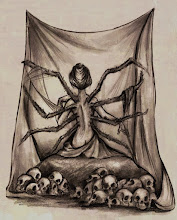Good is more powerful than evil...
Good is more powerful than evil, but its magick is more difficult to learn. - Don Draconus
I've been going over some old homework assignments from coven recently, and I've felt this need to revist some of them. There are some that I didn't give (in my opinion) enough thought to. There are others that I've grown since I last wrote on them, and perhaps my ideas have changed.
The quote above was one of our assignments. We were to write a bit about what we think the quote means. It's funny, because, while it's a personal interpretation, there's a "right" and a "wrong" answer. And I hate open-ended "write your own opinion" things that have a right and wrong type of answer. I vaguely recall having my answer critiqued, and then Amaranthea patting me on the head and telling me that it was a nice try.
So let's take another crack at this one.
In order to answer this properly, you need to have working definitions of "good" magick, and "evil" magick. I'd consider "good" magick to be those works done for benevalent intents. That would include healings, banishings (to an extent), works to help improve the environment, works to spur on creativity and dedication, works on yourself, etc. Good magick benefits someone with as little "fall out" as possible. You think through what you're doing, and do your best to harm no one, not even yourself, in the process. It's works for progress or betterment, but not with total disregard to others.
I'd consider "evil" magick to be those works done without any thought to how they will affect others. Works that are done in *SPITE* of what the outcome will be to anyone but the person performing the magick. Binding spells (that are not done to bind someone from hurting themselves or others), destructive magick, magick to break up a relationship, works to coerce someone to do something against their will (typically). Evil magick benefits the crafter with little thought to what harm it might bring to others, including the caster, just as long as the wanted effect takes place.
So, with our definitions firmly in place, it's sort of an easy jump to see why good magick would be more difficult to learn. You have to take in a lot of different variables when you do acts of good magick. You have to see where your ripples will form, and what sort of results they will have when they touch land. You have to see your magick through to the end before it happens, to figure out what results casting it will have to those around you. Even if you don't intent to affect them with your working, they might still catch some fall-out, so you must be careful. You must be focused in your task. Mis-wording your spell will alter it in ways you did not forsee.
I also think it takes more of a trained mind to do "good works". For all the reasons enumerated above, as well as for the parts of yourself that you tap into when you perform the magick. For "evil" magick, I feel that you're tapping more into primal, gutteral forces. Those root forces that we've had since the caveman days. Ug wants woman. Ug smacks woman in head. Ug takes woman. Without thinking about the fact that the club to the head will damage the woman, or maybe she has another family already with which she's perfectly content. Now, if Ug tried to woo the woman away from her family using his caveman wiles and the fact that his cave has central air and heat, that might be a different story. She left because she wanted to - not because she was forced to at club-point.
And I think it's that infant mentality that you're using when you do evil acts. It's the "mine mine mine" whine of a 5 year old. Instant gratification, I want it now and I don't care what you have to do without to get it for me. It's selfish. And it's easier to generate energy when it's a selfish act. It's completely for your benefit, so of course you'll be focused and intent on the goal. Especially when you don't have to think of the repurcussions of your actions. Who cares if the woman's husband misses her - Ug needs woman.
And it's the training, and the forethought, and the building of the spell that really make the work powerful. While there are destructive and constructive forces in nature, the destructive forces aren't evil. They serve a purpose. You must burn a bit of the forest to cause the seeds in the acorn to erupt from their housings and take to the soil to make new trees. You must destroy sick cells in the body to allow healthy cells to flurish.
Anyone can light a fire. It takes a skilled expert to light a controlled fire, monitor the burn, and put it out when it's done it's work. Anyone can do magick. To do good magick, and to do it well, takes training, forethought, and effort.


0 Comments:
Post a Comment
<< Home